 Petzlover
Petzlover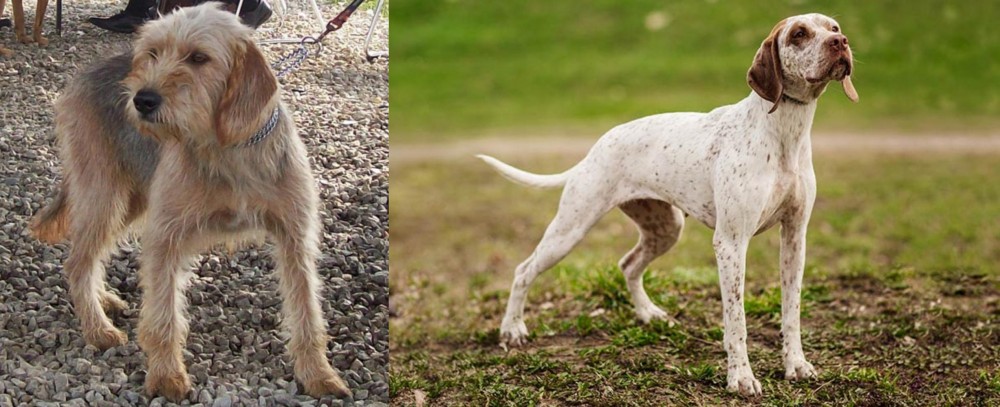 Bosnian Coarse-Haired Hound is originated from Bosnia and Herzegovina but Braque du Bourbonnais is originated from France. Both Bosnian Coarse-Haired Hound and Braque du Bourbonnais are having almost same height. Both Bosnian Coarse-Haired Hound and Braque du Bourbonnais are having almost same weight. Bosnian Coarse-Haired Hound may live 3 years more than Braque du Bourbonnais. Both Bosnian Coarse-Haired Hound and Braque du Bourbonnais has almost same litter size. Bosnian Coarse-Haired Hound requires Moderate Maintenance. But Braque du Bourbonnais requires Low Maintenance
Bosnian Coarse-Haired Hound is originated from Bosnia and Herzegovina but Braque du Bourbonnais is originated from France. Both Bosnian Coarse-Haired Hound and Braque du Bourbonnais are having almost same height. Both Bosnian Coarse-Haired Hound and Braque du Bourbonnais are having almost same weight. Bosnian Coarse-Haired Hound may live 3 years more than Braque du Bourbonnais. Both Bosnian Coarse-Haired Hound and Braque du Bourbonnais has almost same litter size. Bosnian Coarse-Haired Hound requires Moderate Maintenance. But Braque du Bourbonnais requires Low Maintenance
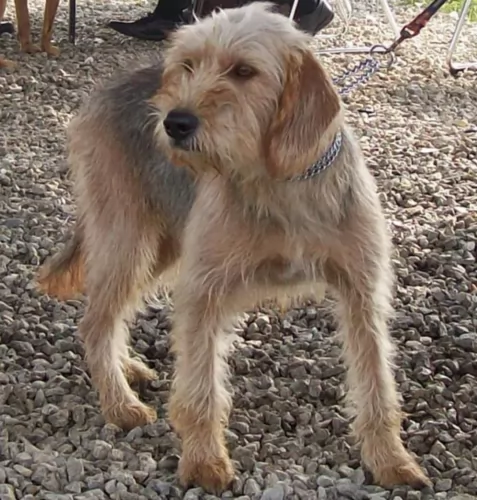 Once known as the Illyrian Hound and also known also as the Barak, the Bosnian Coarse-haired Hound was developed in Bosnia, and as a scenthound, it would hunt large game. Barak belongs to the hound group so typically this dog wants to chase wild game which he used to do long ago for his master.
Once known as the Illyrian Hound and also known also as the Barak, the Bosnian Coarse-haired Hound was developed in Bosnia, and as a scenthound, it would hunt large game. Barak belongs to the hound group so typically this dog wants to chase wild game which he used to do long ago for his master.
The breed was developed into what is's current looks are. In the 1890’s he was crossed with Italian gun dogs with local scent hound stock. It is a rare breed, and outside of Bosnia and Herzegovina, it is all but unknown.The dog is also known as the Bosnian-Rough-Coated Hound or the Illyrian Hound. In 2006 the breed was recognized by the United Kennel Club as the Barak in the Scenthound group. Unfortunately, while the Bosnian Coarse-Haired Hound is still found in Bosnia, there is plenty of conflict in the country, and the future of the dog is unknown.
 The Braque du Bourbonnais is an ancient breed, seen in the 15th century in France in the province of Bourbonnais. He became extremely popular with hunters by the 1800’s as a good pointer. He has become very popular in the United States and all of North America. There are often more puppies born in the U.S. than in France. The British call this breed the Bourbonnais Pointing Dog.
The Braque du Bourbonnais is an ancient breed, seen in the 15th century in France in the province of Bourbonnais. He became extremely popular with hunters by the 1800’s as a good pointer. He has become very popular in the United States and all of North America. There are often more puppies born in the U.S. than in France. The British call this breed the Bourbonnais Pointing Dog.
As with so many European hunting and working dogs, the Braque du Bourbonnais almost disappeared following World War I but was saved by the first breed club, established in 1925. Then following World War II, they were again in danger as the club dissolved and birth rates among the breed decreased drastically.
Actually, there were no dogs at all in the French registry between 1963 and 1973. This was attributed to the fact that the registry put more emphasis on the secondary characteristics such as color, length of tail) instead of the hunting characteristics. Because of this some hunter-breeders vowed to bring the real Braque du Bourbonnais back.
Michel Comte took on this task in 1970 but could not find any dogs with pure Bourbonnais blood. So, he took missed breed with characteristics like the Bourbonnais and inbred several litters until he had a dog he was satisfied with. He registered this dog with the LOF in 1973-75. Seeing this several other breeders got into the act and they successfully brought the breed back.
Michel became president of the new Club du Braque du Bourbonnais in 1981 and remained so until 2001. During this time the breed excelled at field trials and was first sent to the U.S. in 1988. The breed is now thriving in both Europe and North America.
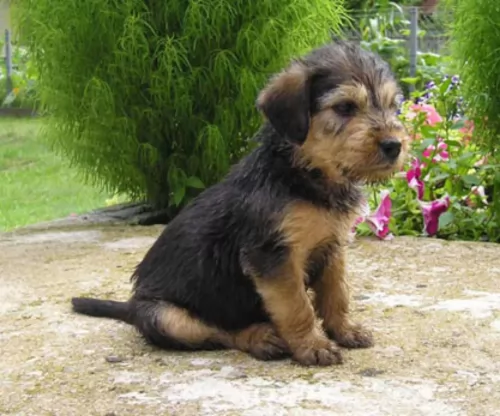 The medium to large sized dog is known for his coarse, shaggy coat of wheaten, black, red or grey shades. Some dogs are bi- or tri-colored. The shaggy coat has a thick undercoat and this is what provides insulation for the dog to cope in extremely cold weather conditions. He is a moderate shedder and he will need to be brushed thoroughly twice a week to remove his loose hairs.
The medium to large sized dog is known for his coarse, shaggy coat of wheaten, black, red or grey shades. Some dogs are bi- or tri-colored. The shaggy coat has a thick undercoat and this is what provides insulation for the dog to cope in extremely cold weather conditions. He is a moderate shedder and he will need to be brushed thoroughly twice a week to remove his loose hairs.
Some dogs have white marks on the head. The height of this dog ranges between 46–55cm at the withers and he can weigh in at between 16–24kg. He is well known for his facial hair – a moustache and beard on the muzzle with large, brown eyes and an intelligent, alert and playful expression.The Bosnian Coarse Haired Hound is a robust dog with a deep chest that provides him with a well proportioned appearance. The brown eyes have bushy eyebrows, the ears fairly long and floppy and the tail long and somewhat feathery.
The Bosnian Coarse-haired Hound makes an exceptional pet because he is loyal and friendly with his family members and patient and tolerant of children’s antics. He also gets on well with other pets in the house.
 This is an elegant breed with a medium sized, muscular bod and a round head. The nose will be the color of the coat and the muzzle is cone shaped with a wide base. He has large dark or hazel eyes, again depending on the color of the coat. The ears can drop below the throat and the neck is very muscular. He has a deep, wide chest and straight, muscular legs. The coat can come in two colors – liver and fawn – and ticked or spotted. They have a typical short pointer type tail.
This is an elegant breed with a medium sized, muscular bod and a round head. The nose will be the color of the coat and the muzzle is cone shaped with a wide base. He has large dark or hazel eyes, again depending on the color of the coat. The ears can drop below the throat and the neck is very muscular. He has a deep, wide chest and straight, muscular legs. The coat can come in two colors – liver and fawn – and ticked or spotted. They have a typical short pointer type tail.
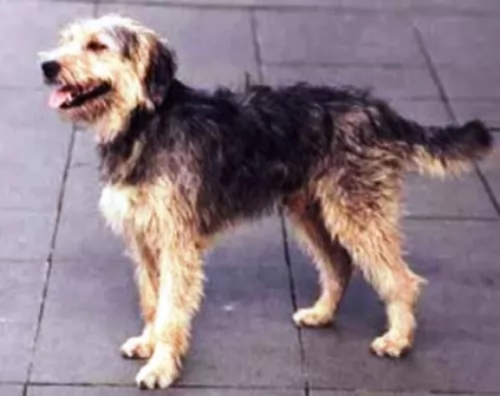 Bosnian Coarse-Haired Hounds are loyal, loving dogs. They are intelligent too and easy to train. With training and socialization, they are well behaved and a pleasure to have in the home. He makes an excellent pet for any family who bears in mind that he needs lots of exercise. When he uses up his energy with games, walks and other activities, he becomes a playful friend with children in the house.
Bosnian Coarse-Haired Hounds are loyal, loving dogs. They are intelligent too and easy to train. With training and socialization, they are well behaved and a pleasure to have in the home. He makes an excellent pet for any family who bears in mind that he needs lots of exercise. When he uses up his energy with games, walks and other activities, he becomes a playful friend with children in the house.
His temperament fits his tousled looks and he is outgoing, amicable, social and friendly. He wants to be a member of the family and to be part of all the activities going on. When he is happy and well cared for, he makes a splendid pet.
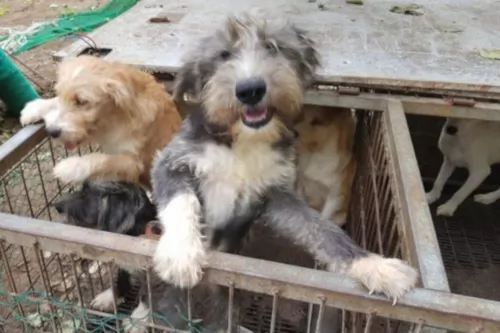 The Bosnian Coarse-Haired Hound is a generally healthy breed, but just like with other dogs, he can also be prone to some hereditary health issues.
The Bosnian Coarse-Haired Hound is a generally healthy breed, but just like with other dogs, he can also be prone to some hereditary health issues.
This is essentially a kind of degenerative arthritis and can be painful for your pet. You’ll notice that he battles to get up after lying down. There are some treatment options that can alleviate his pain and make him more comfortable, but there is no cure.
It is essentially where the dog’s hips partially dislocate and it is a genetic condition. It is more usual in larger dogs but any dogs can battle with hip dysplasia.
This occurs when your dog’s kneecap is dislocated. It can be a genetic malformation or trauma. A dislocated kneecap is a common knee joint abnormality and a dog with a dislocated kneecap will have abnormal hind-limb movement, occasional skipping and even lameness.
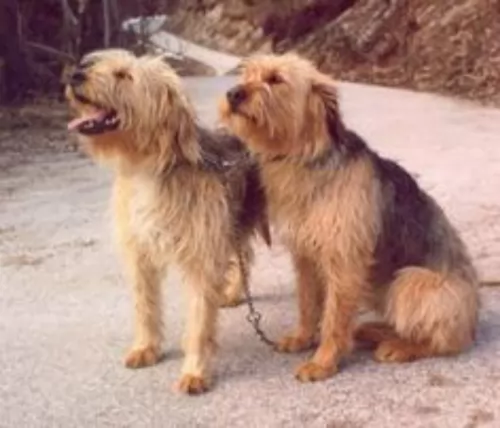 This bearded dog is energetic so he will need to be exercised by you. You can take him on walks or take him to the park or play ball games with him. He will be prone to excessive barking and other kinds of destructive behavior through no fault of his own if you buy a pet like this and just plonk him in your back garden. He wants to be a part of your family and exercising him daily is part of owning a pet like the Bosnian Coarse Haired Hound.
This bearded dog is energetic so he will need to be exercised by you. You can take him on walks or take him to the park or play ball games with him. He will be prone to excessive barking and other kinds of destructive behavior through no fault of his own if you buy a pet like this and just plonk him in your back garden. He wants to be a part of your family and exercising him daily is part of owning a pet like the Bosnian Coarse Haired Hound.
The Bosnian Coarse Haired Hound is a strong-willed dog and intelligent too. Train him and socialize him because then he becomes such an obedient, amicable pet who just wants to please.
Your Barak is an energetic breed so he will need top quality food packed with vitamins and minerals that can provide him with the energy he needs. When it comes to feeding your Bosnian Coarse Haired Hound, store-bought dog food comes in a dry form or wet canned form.
If you’re unfamiliar with these foods, you can also speak to your veterinarian about the best food for your pet. Many dogs are lucky because their owners provide homemade diets – raw or cooked meat, vegetables and rice. A good multivitamin with omega 3 is also recommended for your pet as this can ensure his coat is shiny and his eyes bright and alert. Fresh, cool water must be within reach day and night.
 This breed is prone to weight gain and obesity. Be careful not to overfeed them. Don’t free feed them but give them 2-3 smaller meals per day.
This breed is prone to weight gain and obesity. Be careful not to overfeed them. Don’t free feed them but give them 2-3 smaller meals per day.
Entropion - both of these are issues with eyelashes turning inward or outward and both can
Pulmonic Stenosis of the heart- minor will have no symptoms but eventually the heart will not be able to function efficiently and could lead to congestive heart failure.
The Braque du Bourbonnais needs at least a minimum amount of exercise daily , especially if he is not used for hunting. A fenced backyard for playtime would be perfect but long walks will work. He likes to learn tricks, play ball or hide and seek. Outside activities could include hiking, swimming, agility, retrieving, rally and obedience trials, along with the usual field trials.